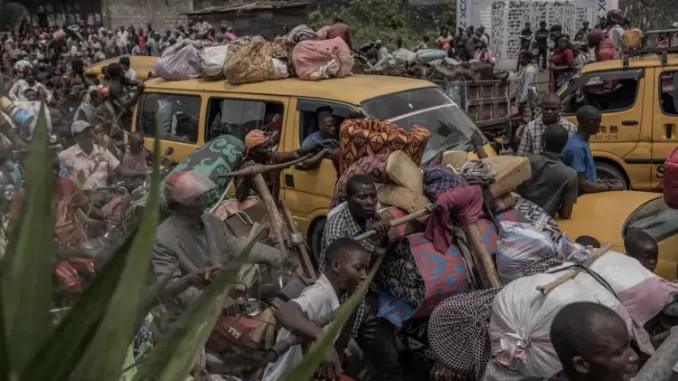
United Nations humanitarians revealed that escalating violence in eastern Democratic Republic of the Congo has continued to uproot thousands of people to neighbouring countries where they face dire conditions without many basic necessities.
The UN refugee agency, UNHCR, reported that 35,000 Congolese nationals have now reached Burundi since the beginning of February, 2025, as Rwanda-backed M23 fighters continue to advance across both South and North Kivu.
UN human rights office in DRC also expressed concern over growing lawlessness as warlords responsible for grave crimes including rape, were reportedly sprung from prison in Goma, Kabare and Bukavu in recent days.
According to the office, the former detainees are now at large and pose a threat to their former victims and judges who sentenced them, stressing that they present a danger to the lawyers who represented victims of sexual violence.
Director of the UN Joint Human Rights Office in DR Congo, Patrice Vahard, emphasized the severity of the situation.
9News Nigeria reports that some of his words were; “The consequences will be huge, first for the state of law, but in particular for these women who believed in justice because they received help, but who unfortunately now risk being confronted by some of their tormentors.”
Also, UNHCR spokesperson Olga Sarrado said that those fleeing DR Congo had been entering Burundi via its northwestern border.
“The vast majority are women and children, they are arriving exhausted, tired. “Many of them tell our teams on the ground that they have lost family members, sometimes children, while they were fleeing,”she said.
Sarrado described dire conditions at the border and said that the majority of those arriving from DRC do so by unofficial means, with many taking risks to cross the Ruzizi River.
“Some of them are sheltering in the open, just in makeshift shelters, others are being sheltered in schools and also in a stadium at the border,” the UN refugee agency official added.
“Needs are increasing and there is a significant shortage of basic services in the displacement shelters including toilets, food and water.”
The UN World Food Programme, WFP, announced that it had partially resumed food assistance to parts of Goma, which fell to M23 rebels three weeks ago.
But as fighting between M23 and national troops continues, the UN aid agency expressed alarm at “soaring hunger” caused by people fleeing displacement camps.
In North Kivu, WFP has reached 9,000 people with emergency food assistance out of a target of 83,000.
“Security must improve for WFP to reach tens of thousands more of the most vulnerable populations at risk,” it stressed.
Where possible, the UN agency is delivering vital nutrition supplies to treat moderate acute malnutrition in children aged six to 59 months, amid surging staple food prices that have made it increasingly difficult for families to eat.
The price of maize flour has risen by nearly 67 per cent, salt is 43 per cent more expensive than before the crisis erupted and the cost of cooking oil has increased by up to 45 per cent, WFP said.
“Escalating violence is forcing more families to flee – and now they have no food, no security and nowhere safe to go,” WFP spokesperson Shaza Mograby said.
“The desperation of affected communities continues to grow by the day.”
Humanitarians continue to struggle to reach the most vulnerable while major access routes remain blocked and Goma International airport remains closed.
“WFP’s priority is to resume operations fully as soon as it is safe to do so,” the UN agency insisted.
“The longer we are unable to give food and emergency assistance to families affected by the conflict, the greater and direr their needs are,” Peter Musoko, WFP’s Country Director and Representative in DRC, said.
“I do not want to see children and mothers sink deeper into hunger and severe malnutrition.
“We need the violence to stop so we can resume our humanitarian activities. The most vulnerable people in DRC cannot afford to be overlooked during this crisis.”
